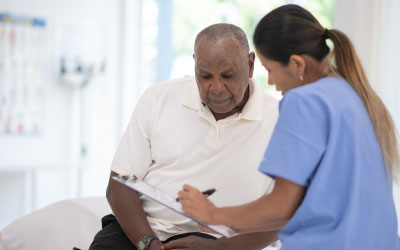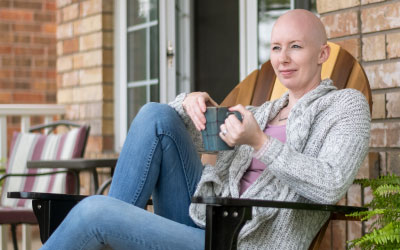Getting Support
Going through cancer treatment is one of the most challenging things you will face. Although asking for help or admitting you need support may be hard, it can make a world of difference in your daily life during and after treatment. This page provides information on getting help for emotional and practical concerns.
Emotional support
Cancer can cause feelings of anxiety, distress, and depression. It's important to recognize when these feelings impact your daily activities and when it's time to seek support.
Emotional support can include support groups, peer support, and individual counseling. Talk to your doctor about what you are experiencing, so they can help you find the right type of support for you.
Support groups
Support groups bring patients together who are experiencing similar situations to share their concerns and learn how others have coped.
There are also support groups for families, children, and caregivers of people with cancer. These groups often discuss common concerns, like changes in relationships, fears about the person with cancer, and how to best support them.
You may need to try a few support groups before finding one that works for you. Ask your doctor or social worker for recommendations on groups in your area.
Peer support / communities
Connecting with other patients or caregivers one-on-one or through an online community can provide a safe place to talk with others, share your experiences, and get advice.
Many organizations, including the Leukemia Research Foundation, offer free online peer support programs to cancer patients. Here are a few.
- Leukemia Research Foundation Mentoring Program: Through our partnership with Imerman Angels, patients and caregivers can connect one-on-one with a mentor who has experienced the same type of cancer. Participation is free.
- Leukemia Research Foundation Online Support Community: Our free online support community allows you to connect with other patients or family members/caregivers of patients with the same diagnosis.
- MyHealthTeams: Free diagnosis-specific online support communities for patients and caregivers.
Individual (one-on-one) counseling
One-on-one counseling might be a good option if your feelings keep you from doing your normal activities. In counseling, you can talk with a trained professional about your worries and concerns. Having cancer or having a loved one with cancer is a different experience for each person. Individual counseling gives you a chance to focus on your feelings and concerns.
A counselor may also suggest couples or family counseling. This helps a couple or family figure out what problems they are having. Learning why you or your family members act in specific ways is key to dealing with it. A counselor will work with your family to improve how they express their feelings and help resolve conflicts.
When looking for a counselor, think about the kind of help you need. There are many options, including psychiatrists, psychologists, oncology social workers, psychiatric nurses, and licensed counselors. Each has different training and focus. If you are not sure which one to choose, ask your doctor what they suggest.
Most of the time, you will want a counselor who has experience working with people with cancer. The below organizations offer a directory of oncology-trained professionals in your area. Your medical center may also provide counseling services.
- Association of Oncology Social Work
- American Psychological Association
- BMTInfoNet (for transplant and CAR T-cell therapy recipients)
- Substance Abuse and Mental Health Services Administration
Legal support
Cancer patients and their families may face several legal issues before, during, and after treatment. Cancer-related legal problems can include health insurance coverage, employee and work rights, disability insurance, and estate planning.
The below organizations offer legal information and assistance to cancer patients.
- Cancer and Careers: Expert advice and information for employee and work-related legal issues.
- Cancer Legal Resource Center: Information and resources for all cancer-related legal issues.
- Patient Advocate Foundation: Legal assistance for access to care, medical debt, and job retention issues.
Financial and insurance support
A cancer diagnosis often comes with many unexpected and unplanned financial expenses. There are numerous resources and financial assistance programs available to cancer patients. Most medical centers have oncology social workers on staff who can help you with insurance and financial issues.
You can also find resources yourself online. Here are some that might help.
Insurance
- Disability Insurance (Triage Cancer): Disability insurance may provide you with some income if you can't work because of your medical condition. This guide offers more information on disability insurance and other benefits.
- Family Medical Leave Act (Triage Cancer): The Family and Medical Leave Act (FMLA) allows eligible employees up to 12 weeks per year of unpaid, job-protected leave. This guide has more information on how FMLA and other benefits work.
- Health Insurance Basics (Triage Cancer): Health insurance can be confusing. This guide outlines the basics of health insurance plans and terminology to help you understand your coverage better.
Financial assistance
Many organizations, including the Leukemia Research Foundation, offer expense reimbursement and grant programs to patients and families. There is also financial assistance available for some medications.
Visit our Financial Assistance Resources webpage for a comprehensive list of programs and resources available.
Transportation support
Transportation should not be a roadblock to receiving treatment. Many resources are available to patients through medical centers, government agencies, and nonprofits.
Here are some often overlooked ways to find or receive transportation services.
- Ask your medical center if they offer transportation (some do). Your social worker should also be able to provide you with a list of transportation resources in your area.
- Cancer patients with Medicaid medical insurance may be eligible for non-emergency transportation to doctor appointments that address Medicaid-approved care. Rides in your area may be offered by taxi, car, van, or a form of public transportation. Call your Medicaid caseworker for more information and eligibility.
- Larger towns or cities may offer transportation for disabled and older adults for whom public transit is not manageable. Call your local government to inquire about services that may be available to you.
The below nonprofits also offer transportation and financial assistance programs to qualifying patients.
- American Cancer Society: Provides transportation assistance programs across the United States through their Road to Recovery program.
- Leukemia & Lymphoma Society: Offers qualifying leukemia patients a grant through their Susan Lang Pay-It-Forward Patient Travel Assistance program.



